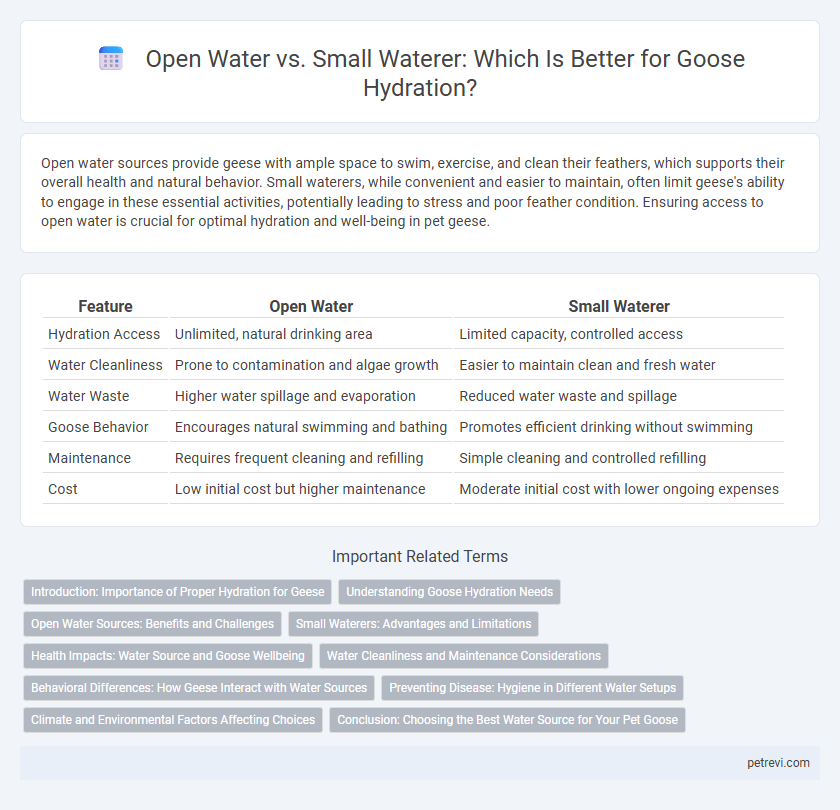Open water sources provide geese with ample space to swim, exercise, and clean their feathers, which supports their overall health and natural behavior. Small waterers, while convenient and easier to maintain, often limit geese's ability to engage in these essential activities, potentially leading to stress and poor feather condition. Ensuring access to open water is crucial for optimal hydration and well-being in pet geese.
Table of Comparison
| Feature | Open Water | Small Waterer |
|---|---|---|
| Hydration Access | Unlimited, natural drinking area | Limited capacity, controlled access |
| Water Cleanliness | Prone to contamination and algae growth | Easier to maintain clean and fresh water |
| Water Waste | Higher water spillage and evaporation | Reduced water waste and spillage |
| Goose Behavior | Encourages natural swimming and bathing | Promotes efficient drinking without swimming |
| Maintenance | Requires frequent cleaning and refilling | Simple cleaning and controlled refilling |
| Cost | Low initial cost but higher maintenance | Moderate initial cost with lower ongoing expenses |
Introduction: Importance of Proper Hydration for Geese
Proper hydration is crucial for geese to maintain optimal health, support digestion, and regulate body temperature. Open water sources provide geese with natural environments to clean their beaks and engage in instinctive behaviors, promoting overall well-being. Small waterers offer controlled water access, reducing contamination risks but may limit natural hydration habits essential for geese's physical and behavioral needs.
Understanding Goose Hydration Needs
Open water sources provide geese with ample space for natural behaviors such as swimming and cleaning, supporting their overall health and hydration more effectively than small waterers. Small waterers may limit access and fail to meet the daily water intake requirements essential for maintaining proper hydration and digestion. Ensuring geese have continuous access to clean, open water promotes optimal hydration, reduces stress, and supports their physiological and behavioral needs.
Open Water Sources: Benefits and Challenges
Open water sources provide geese with natural hydration and opportunities for behaviors like dabbling and preening, promoting overall health and well-being. These sources offer abundant space and water quality influenced by environmental factors such as temperature and contamination risks. Challenges include maintaining water cleanliness and preventing disease transmission, which require regular monitoring and management to ensure safe access for the flock.
Small Waterers: Advantages and Limitations
Small waterers for goose hydration offer advantages like reduced water contamination risk, ease of maintenance, and controlled water intake, promoting better health and hygiene. They minimize water spillage compared to open water sources, conserving water and maintaining cleaner feeding areas. However, small waterers may require frequent refilling and can limit the natural drinking behavior of geese, potentially impacting their hydration patterns.
Health Impacts: Water Source and Goose Wellbeing
Open water sources provide geese with a natural environment that encourages healthy drinking behavior and reduces the risk of stress-related issues, while also allowing for natural preening and social interaction. Small waterers, though easier to manage, can restrict movement and lead to the accumulation of harmful bacteria if not cleaned frequently, potentially causing respiratory and digestive health problems. Ensuring clean, accessible open water supports optimal hydration, promotes natural instincts, and enhances overall goose wellbeing.
Water Cleanliness and Maintenance Considerations
Open water sources offer geese abundant space for natural behaviors but pose higher risks of contamination from algae, debris, and fecal matter, requiring frequent cleaning to maintain water quality. Small waterers provide controlled, cleaner hydration environments with reduced exposure to pollutants but demand regular water replacement and sanitation to prevent bacterial buildup. Balancing water cleanliness and ease of maintenance is crucial for sustaining goose health and preventing waterborne diseases.
Behavioral Differences: How Geese Interact with Water Sources
Geese exhibit distinct behavioral differences when interacting with open water versus small waterers for hydration. Open water allows natural foraging, swimming, and preening behaviors, promoting natural instincts and social interactions within flocks. Small waterers, while convenient for controlled environments, limit these activities, often leading to less natural drinking postures and reduced engagement with water-based behaviors.
Preventing Disease: Hygiene in Different Water Setups
Open water sources for geese increase the risk of contamination from feces, promoting the spread of waterborne diseases such as avian influenza and salmonella. Small waterers limit exposure by containing a controlled, easily cleaned environment, reducing pathogen buildup and facilitating regular sanitation. Maintaining clean water in small containers significantly enhances hygiene, preventing illness and supporting overall flock health.
Climate and Environmental Factors Affecting Choices
Open water sources provide geese with ample space to hydrate naturally, supporting their preference for cleaner, flowing water that reduces contaminant buildup in warmer climates. Small waterers offer controlled hydration options ideal for colder environments where open water may freeze, ensuring consistent access to unfrozen water. Environmental factors such as temperature fluctuations and water quality directly influence whether open water or small waterers best meet geese hydration needs.
Conclusion: Choosing the Best Water Source for Your Pet Goose
Open water sources provide geese with ample space to swim and naturally engage in their instinctive behaviors but require diligent maintenance to prevent contamination and disease. Small waterers offer a controlled, hygienic environment that reduces water waste and simplifies cleaning but may limit the geese's ability to bathe effectively. Balancing hygiene, ease of maintenance, and the goose's natural needs is essential when selecting the optimal hydration method for pet geese.
Open water vs Small waterer for Goose hydration Infographic

 petrevi.com
petrevi.com